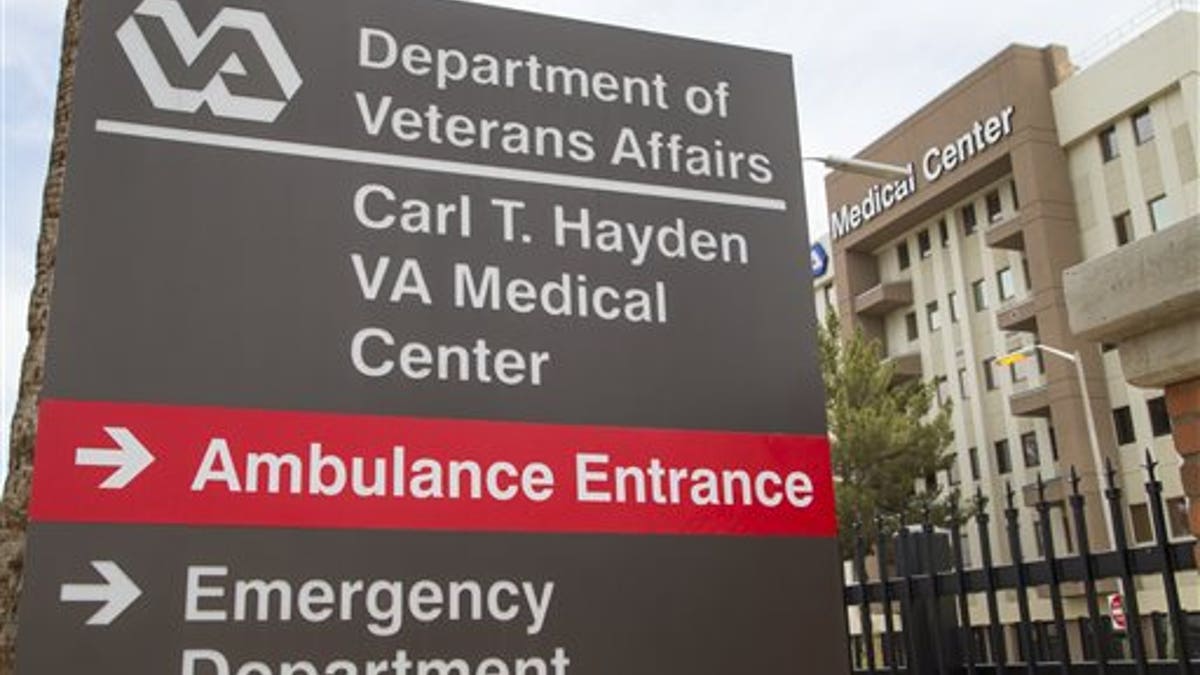
May 28, 2014: The Carl T. Hayden VA Medical Center in Phoenix. (AP)
The brave men and women of our Armed Forces never fail our nation in battle, and we have a duty not to fail them after they re-enter civilian life. In particular, we must not fail those who become involved with the criminal justice system. Many of these veterans need treatment, not incarceration. The good news is that a grassroots movement across America has given rise to more than 200 Veterans Treatment Courts designed to give veterans a better way forward.
One defendant before a Veterans Treatment Court was “Alison,” an Afghanistan war veteran from New Hampshire. After leaving military service, she experienced acute onset of schizophrenia, which went undiagnosed and untreated. One day, her car veered off the road and became stuck in a snowbank. Police arrived to assist, but Alison flashed back to Afghanistan and, believing they were a threat to her, became belligerent. She was charged with assaulting a police officer and resisting arrest. But instead of being tried, convicted and jailed, she was referred to a Veterans Treatment Court, where a specialist from the VA in White River Junction worked with the court to arrange an array of services, including psychiatric assistance, medication monitoring and employment assistance. Alison signed a contract, agreeing to receive mental health treatment for at least a year and to be monitored by the court. Nearly a year later, she has “graduated” from the program, continues to receive treatment and has not re-entered the criminal justice system.
It is a sacrosanct principle instilled in members of our Armed Forces: never leave a warrior behind on the battlefield. This is true in a war zone, and it also should be true in the battles that some veterans face after they return to civilian life.
Since the first Veterans Treatment Court was established in 2008, they have evolved into “one-stop shops” that link veterans with the full array of programs, services and benefits they have earned. The indispensable player in each court is the Veterans Justice Outreach specialist, or VJO, an employee of the U.S. Department of Veterans Affairs. The VJO advocates for veterans who are pre-trial criminal defendants by explaining to prosecutors and judges what services the VA can provide as an alternative to jail. The VJO is a constant presence during court proceedings, often using a laptop computer to access VA medical records and to enroll veteran-defendants in treatment programs on the spot. VJOs also travel across their regions to train police and court personnel to recognize the reintegration challenges associated with military service, especially combat service. “I feel like I have the best job at the VA,” says Diane Levesque, the VJO based in Manchester, N.H. “It’s energizing, and everyone is very appreciative of what I do – the vets, the lawyers, and the judges.”
The VA created the the VJO program to provide an innovative way to address the crisis of countless thousands of veterans who were being locked up and denied treatment – especially those with PTSD and substance abuse issues. But it’s an ad hoc program with no clear legislative authorization, and it faces an uncertain future. A new president or VA secretary could cancel it abruptly.
This is why I have introduced the bipartisan Veterans Justice Outreach Act, which would recognize the VA’s authority to work with veterans prior to incarceration and would recognize in the U.S. Code the ongoing work of VJOs in all 50 states. This would give permanence and stature to the VJO program. And as hundreds more Veterans Treatment Courts are established in the years ahead, creating the need for additional VJOs, this law would boost the program’s clout in the annual competition for funding within the VA budget.
One reason for the effectiveness of Veterans Treatment Courts is that they echo aspects of military culture. They allow veteran-defendants to participate in the court process with volunteer veteran-mentors and VA professionals, re-instilling a sense of military camaraderie. In effect, the court is like a military unit: The judge is like a commanding officer; the peer-mentors are like fire-team leaders; the VJO takes the point position; and the veteran-defendant becomes a soldier with orders to carry out, such as attending a treatment program and reporting back regularly to the court. As with a military unit, Veterans Treatment Courts develop a strong esprit de corps – everyone knows they are doing important, often life-changing work for veterans.
It is a sacrosanct principle instilled in members of our Armed Forces: never leave a warrior behind on the battlefield. This is true in a war zone, and it also should be true in the battles that some veterans face after they return to civilian life. Those who have run-ins with the law deserve treatment, not incarceration. They also need the intervention of skilled, caring Veterans Justice Outreach specialists. It’s time for Congress to recognize in law the vital role of VJOs in securing justice for our veterans.




















